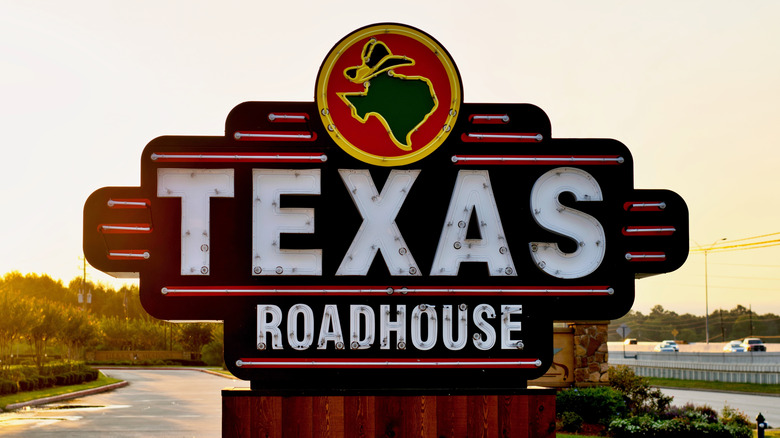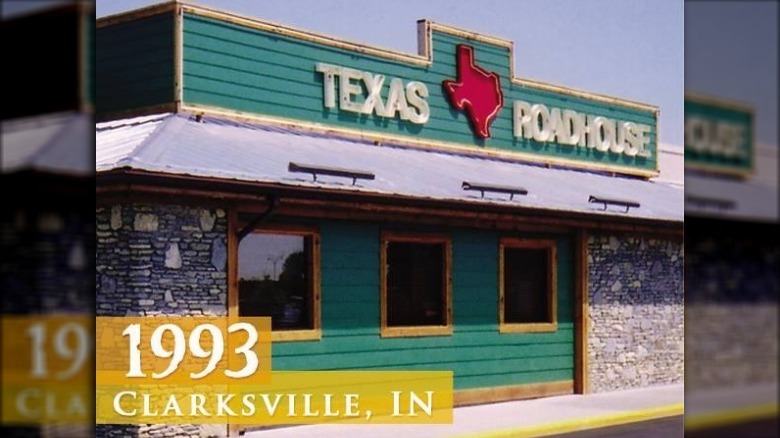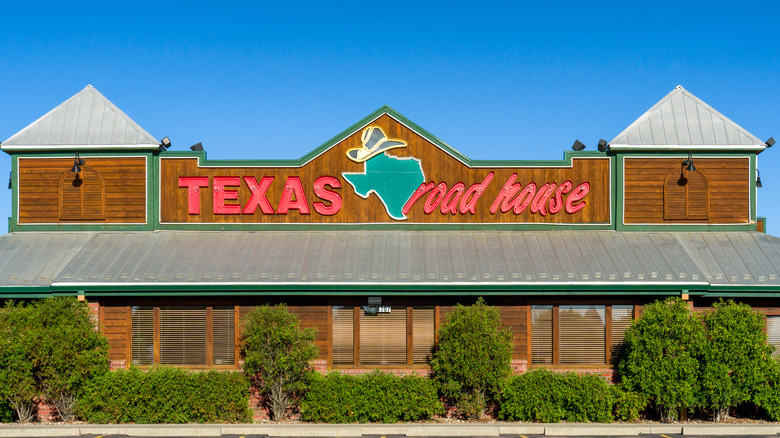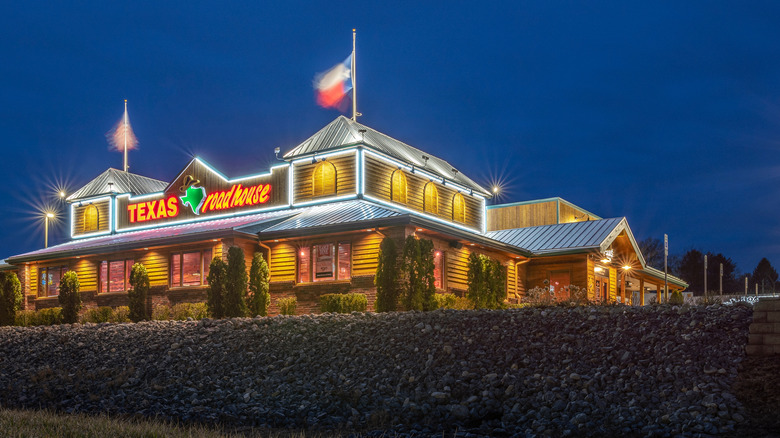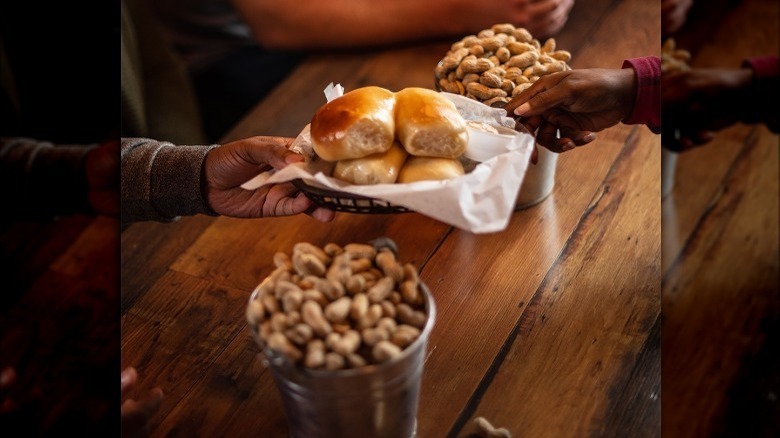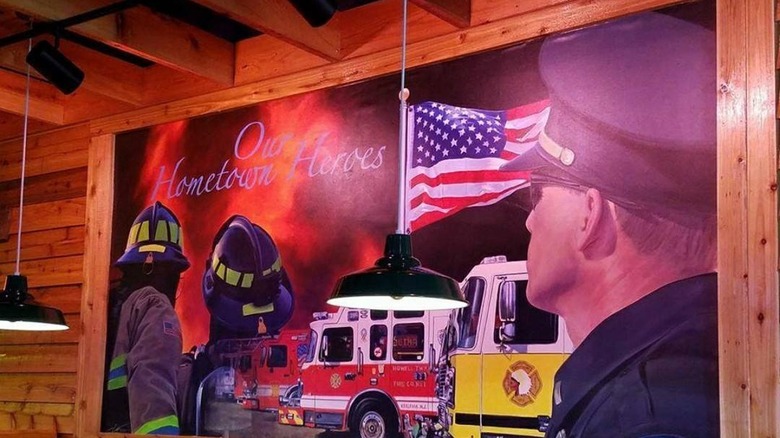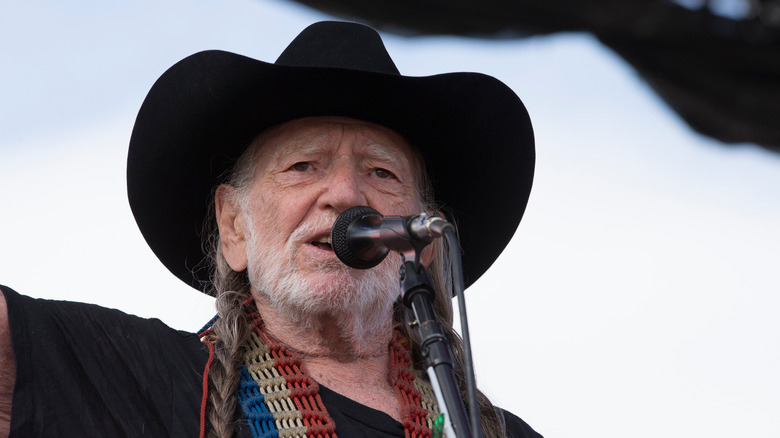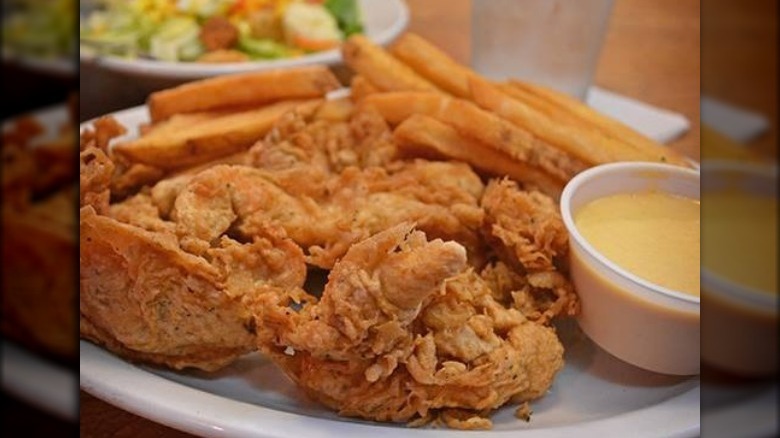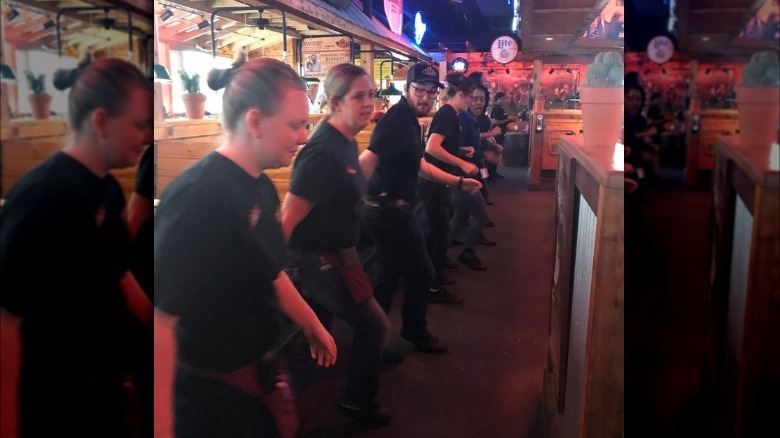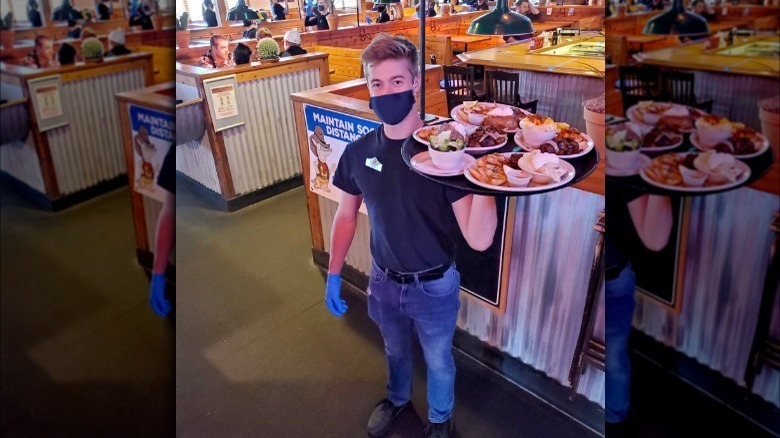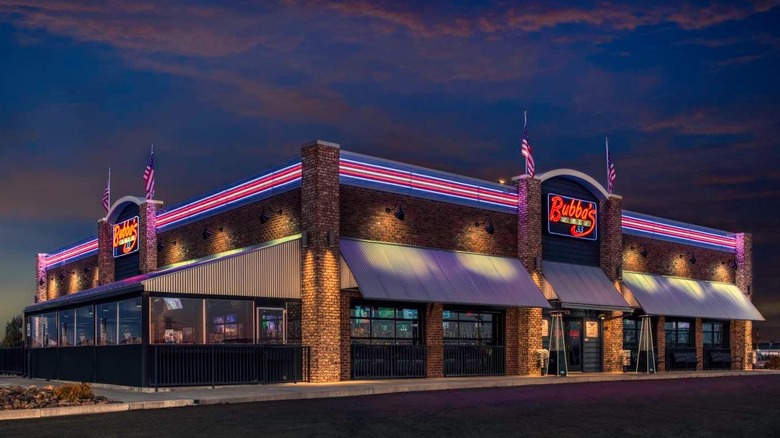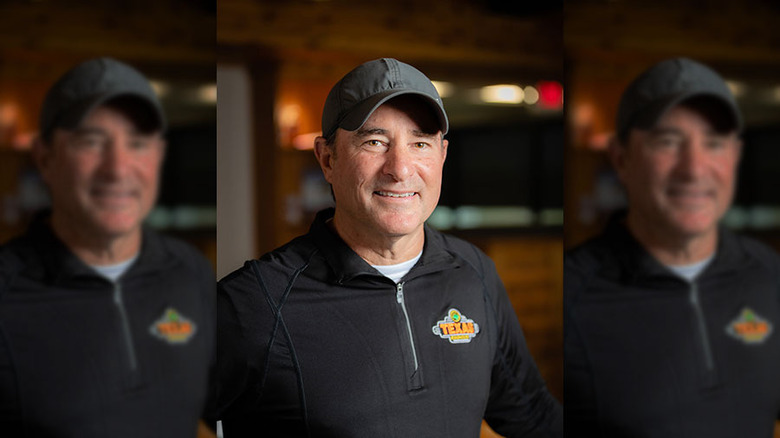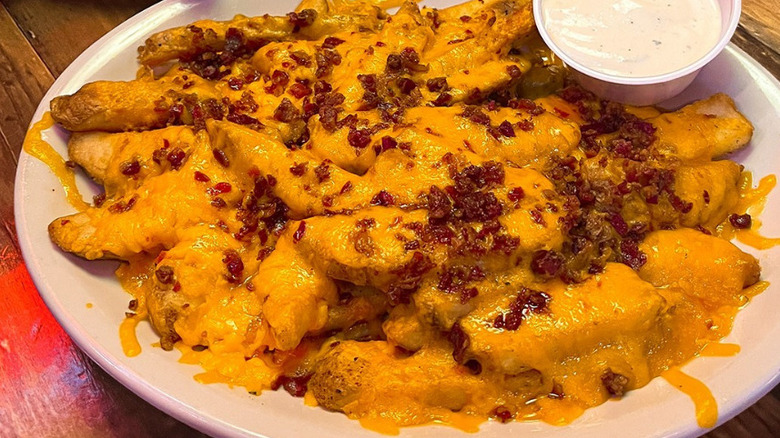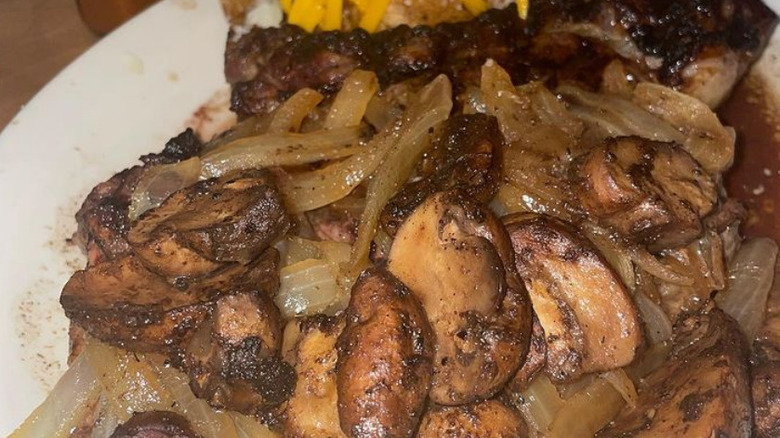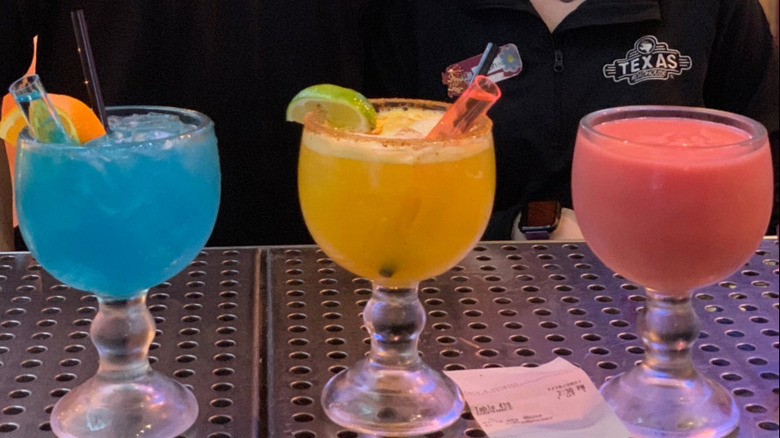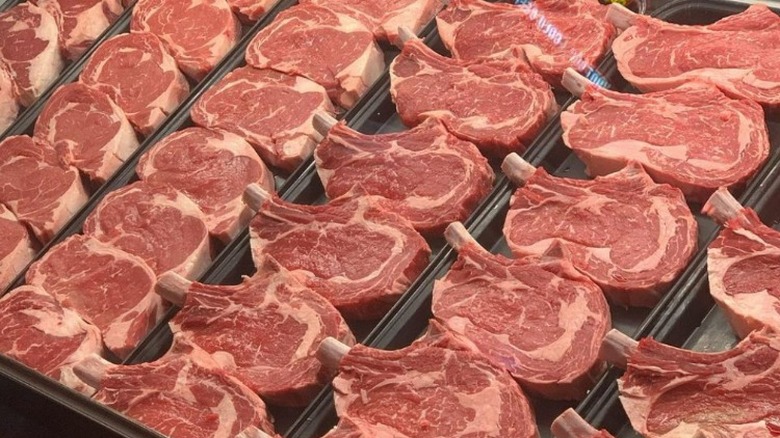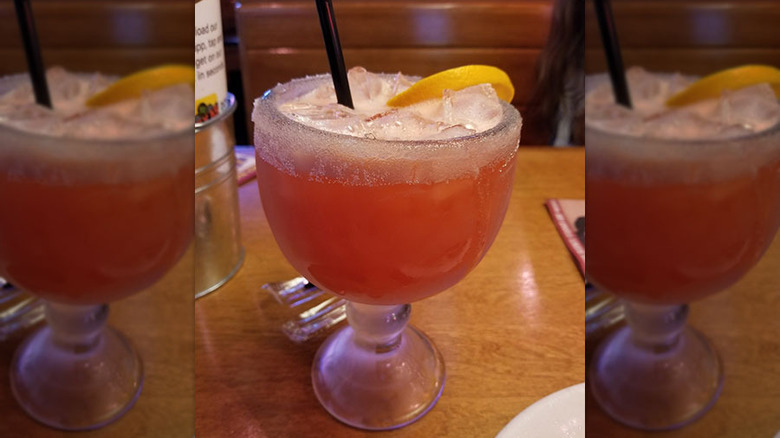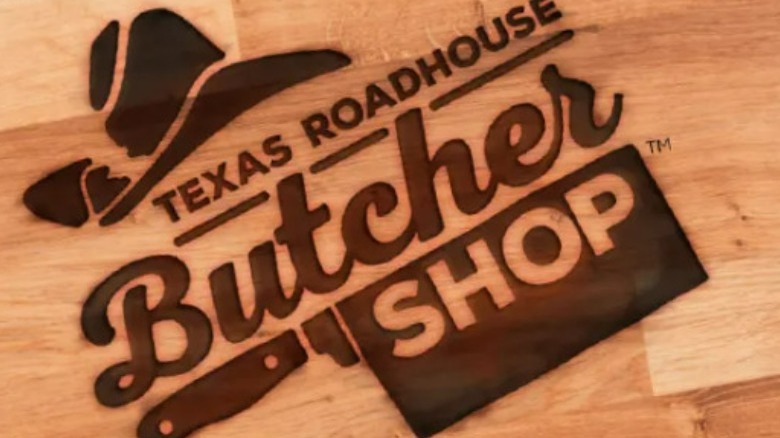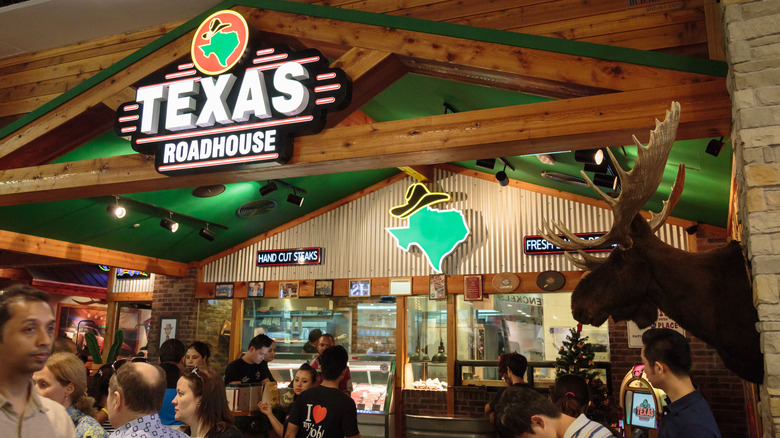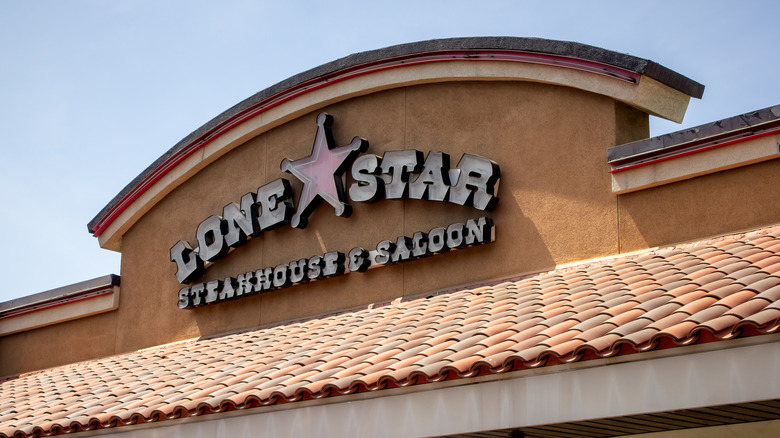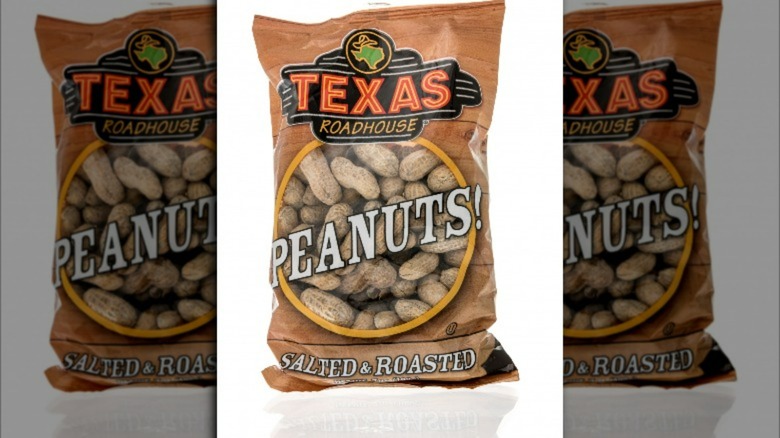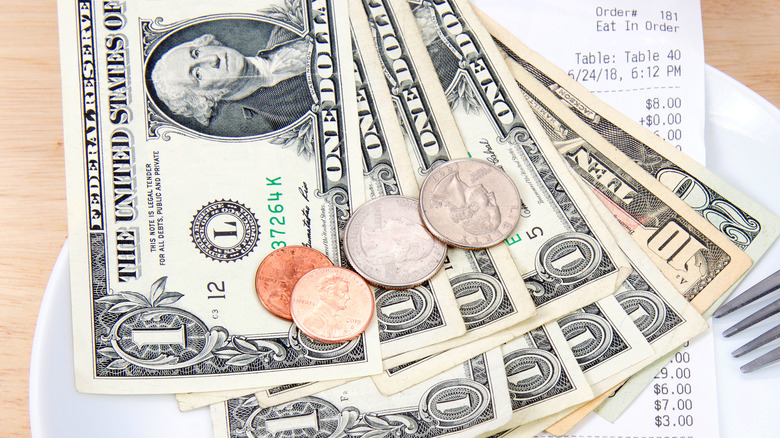The Untold Truth Of Texas Roadhouse
We may receive a commission on purchases made from links.
In less than three decades, Texas Roadhouse has gone from one single location in Indiana to become the largest steakhouse chain restaurant in the country (via Restaurant Business). Today, it has over 600 locations across the country, and can even be found in nine countries abroad. So, how did this once humble operation pull off such an incredibly impressive transformation? Many would say it's thanks to a combination of hand-cut steaks, made from scratch food, and low prices — with a little bit of line dancing mixed in. Of course, all those complimentary peanuts and cinnamon-buttered rolls don't hurt either!
But with any tale this good, there are always some interesting facts and tidbits that get lost along the way. And trust us — Texas Roadhouse has more than its fair share of stories to tell. From its Midwestern beginnings and sister restaurant chains to its connection with Willie Nelson and its founder's tragic death, here is the untold truth of Texas Roadhouse.
Texas Roadhouse began in Indiana
You'd be forgiven for assuming that Texas Roadhouse's story began in the Lone Star State. It is in the restaurant's name, after all. But the chain actually got its start hundreds of miles away in Indiana. In 1993, founder Kent Taylor opened the doors of the first Texas Roadhouse in Clarksville, Indiana, a city located on the Ohio River just across from Louisville, Kentucky. In fact, to this day, the company's headquarters are based in Louisville (via Texas Roadhouse).
But, according to Funding Universe, neither Texas nor Indiana was Taylor's original culinary inspiration. The avid skier loved the mountains of Colorado, where he lived for many years. After moving to Indiana — where he managed several casual and fast food restaurants, including locations for Bennigan's, Hooters, and Kentucky Fried Chicken — he decided to try his hand at operating his own eatery. Naturally, he opted for a Colorado theme. In 1991, with the financial backing of former Kentucky governor John Y. Brown, Taylor opened Buckhead Hickory Grill, today known as Buckhead Mountain Grill, in Louisville. When the business proved to be an immediate hit, the pair hatched plans for a second location, this time in Clarksville, but couldn't agree on how to divide the profits.
Still wanting to open a restaurant in Indiana, Taylor found new investors, but the Colorado theme belonged to Buckhead. Thus, Texas Roadhouse was born. In 1994, Taylor sold his interest in Buckhead and never looked back.
Texas Roadhouse's founder lived at his parents' house
After he graduated from the University of North Carolina, Texas Roadhouse founder Kent Taylor moved to Colorado, where the self-proclaimed ski addict could carve up the mountainside any time he wished, per Funding Universe. It wasn't until he relocated to Indiana that he opened up his steakhouse chain. But why did the avid skier relocate to the Midwest in the first place? In what would ultimately prove to be serendipitous, it was a series of personal setbacks that led Taylor to move back not just to his hometown, but to his parents' house.
Taylor and his wife divorced in 1990, leaving him to raise his two young daughters alone. Soon, he found himself so financially burdened that he was forced to move back in with his mom and dad, according to Investor's Business Daily. This wasn't the worst thing, as Taylor admitted to Investors' Business Daily that his mom "sure helped me with my kids when I was first starting the company."
It proved to be a big help, as Taylor, despite these significant personal and financial setbacks, was able to open the first Texas Roadhouse in 1993, not too long after moving to Indiana. "Things worked out," he said. "I like to fill my mind with positive thoughts. I've always been very persistent and prove the naysayers wrong."
It's now the largest steakhouse chain in the country
Texas Roadhouse has come a long way from its humble beginnings as a single restaurant in Indiana. And its sustainability didn't look too promising when several of its first expansion locations were forced to close, notes Funding Universe. Needless to say, it didn't appear as though Texas Roadhouse would become the largest steakhouse chain in the country — and yet that's precisely what happened.
According to Restaurant Business, the company brought in just over $3 million in revenue in 2019, the most of any steakhouse chain in the United States. That's roughly $400,000 more than its closest competitor, Outback Steakhouse, which had 724 locations compared to Texas Roadhouse's 553. And Texas Roadhouse's success doesn't appear to be slowing down. Aside from a drop in revenue in 2020, which was an industry-wide trend primarily caused by the COVID-19 pandemic, the restaurant chain has seen a significant jump in sales each year since 2017 (via Statista).
Texas Roadhouse spends $20 million a year on peanuts and bread
The first thing any guest notices upon sitting down to eat at Texas Roadhouse is the complimentary bowl of shelled peanuts on the table. In fact, the chain may be better known for their peanuts than their steaks. "We're known for what we call, 'legendary food, legendary service,' but you will always hear people say 'oh, the peanut place!'" Travis Doster, Texas Roadhouse's senior director of public and government relations, told the National Peanut Board. The company has become so famous for its salty snack, in fact, that it now sells bags of them at sports stadiums across the country.
Texas Roadhouse takes its peanuts and freshly baked bread (which is also complimentary) pretty seriously. That's because the restaurant sees them not as just a pre-meal snack, but symbolic of the great value customers get when they dine there. Therefore, the chain invests heavily in these treats. Doster claimed that across all its locations, Texas Roadhouse spends more than $20 million on peanuts and bread, which includes purchasing more than 10 million pounds of peanuts.
But, interestingly, peanuts were not founder Kent Taylor's first choice of snack. "He originally thought about popcorn, believe it or not," Doster said. But Taylor realized that the smell of popcorn would overpower that of the bread. "So the idea of peanuts was born. And the idea of peanuts and bread was to immediately give folks, especially families with their kids, something to eat."
Each Texas Roadhouse restaurant has unique murals
Every McDonald's in the country, whether it be in New York City or rural Idaho, feels and looks exactly the same. It's not by accident. The Restaurant Times reports that chains value consistency so customers can expect the same thing — including interior decorating — at every store, regardless of where it's located. This business model has its merits but it can also make restaurants feel a little soulless. And if there's anything Texas Roadhouse, as a brand, has in spades, it's soul. That's why the company decorates all of its restaurants in a similar style but gives each outlet its own personality.
How does it do this? With murals, of course. Per the Anchorage Daily News, the walls of each Texas Roadhouse location are adorned with murals representing the local area. Most restaurants have seven murals, six of which are unique to that particular store. They include paintings of everything from Mount McKinley in an Alaskan location to portraits of characters from "The Office" in the Scranton, Pennsylvania outpost (via Facebook).
The final mural, the only one found in every location, depicts an older, distinguished Native American, meant to honor Native American culture. According to Anchorage Daily News, founder Kent Taylor believed this particular painting is good luck. Three of the first four Texas Roadhouse restaurants were forced to close early on. The one that stayed open had a version of this mural. Thus, it is now a mainstay.
Every Texas Roadhouse restaurant has a corner dedicated to Willie Nelson
Texas Roadhouse founder Kent Taylor met the icon known as Willie Nelson at a Farm Aid benefit concert. According to Texas Roadhouse, the two became fast friends and bonded throughout the years over more than a few poker games. They were such good friends, in fact, that Taylor decided to incorporate the country music legend into his business. What's a Texas-themed restaurant without some Willie Nelson influence, anyhow?
Although each Texas Roadhouse location's interior decoration is primarily dedicated to representing the local community, every restaurant across the country has one corner dedicated to Willie Nelson, aptly known as "Willie's Corner." It naturally features photos and memorabilia of the legendary country crooner. The restaurant sometimes also distributes Willie Braids to its employees and guests, consisting of a bandana and two pigtail-style braids that mimic Nelson's signature hairstyle (via Louisville Business First).
And like a true friend, Texas Roadhouse always has Nelson's back. When a stuffed armadillo that tours with Nelson was stolen, Louisville Business First reports that the restaurant chain was on the case, offering $1,000 gift cards for any information on the whereabouts of "Ol' Dillo," as the armadillo was called. (The company's mascot is an armadillo named Andy, so this was an important cause on multiple fronts.) USA Today reports that the armadillo was eventually returned unharmed.
Texas Roadhouse only serves lunch on the weekend
If you wake up in the morning with a hankering for some Texas Roadhouse ribeye, porterhouse, cheeseburgers, rolls and cinnamon butter, or all of the above, you're going to have to muster up some patience. The steakhouse chain abides by a dinner-only philosophy. This means that it's only open for lunch on the weekends.
Why does Texas Roadhouse forego the potential revenue lunch? There are a few reasons, starting with the well-being of its employees. According to the company's fact sheet, the restaurant is closed for lunch during the week to help its employees, particularly managers, maintain a healthy work-life balance. Not only does this improve the work situation for Texas Roadhouse employees, but it also makes them better at their job, according to founder Kent Taylor. "You have better execution when you're focused on two shifts," Taylor told Forbes. "Most chains only do 30 percent of business at lunch. I get my A team working for dinner. I like that."
Only serving dinner also helps Texas Roadhouse save money on real estate costs. Most people eat lunch during the week close to where they work, which is often in a high-traffic area. But owning or renting a property in these areas costs far more than in less densely populated locations. By not having to focus on the lunch crowd, Texas Roadhouse can set up shop just off the beaten path, where the cost of owning real estate can be significantly lower.
Some Texas Roadhouse servers line-dance while working
Texas Roadhouse may not have begun in the Lone Star State but it sure has adopted its culture. That includes, of all things, line dancing. Members of the service staff at Texas Roadhouse restaurants are often known to line dance throughout their shift. To be more precise, they dance along to one song every hour, according to the restaurant's Twitter, so you're bound to catch at least one performance during your meal.
"It's just something fun for the guests," the owner of a Wichita, Kansas restaurant told The Wichita Eagle. "It's just part of what we do at Texas Roadhouse, have some fun and keep the energy up and guests love it. We pull kids out and they come out and dance and things like that."
It has become such a tradition at Texas Roadhouse that the company has gone as far as hosting line-dancing competitions with the staff of different restaurants across the country going head to head (via Marietta Daily Journal).
Texas Roadhouse was very popular during the pandemic
Few industries, if any, were hit harder by the COVID-19 pandemic than the food industry. But, while some restaurants have been forced to close, others have fared better. On the top of that list is Texas Roadhouse. According to the marketing agency TOP, Texas Roadhouse was the most popular casual dining chain in the country during the one-year period from July 2019 to July 2020. The steakhouse restaurant was the most visited casual dining destination in 15 different states, from Arizona and Colorado, to Massachusetts and Maine. It was also among the top five such eateries in 18 other states.
Texas Roadhouse's success can be attributed to its rapid business model transition, according to FSR. The restaurant was quick to switch to a curbside and drive-thru operation, equipped all employees with gloves and masks, and even set up double-drive-thru tents. The results were downright staggering. FSR reported that, in January 2020, Texas Roadhouse's to-go business was bringing in roughly $8,400 per week at each location. By the end of April, that number skyrocketed 575 percent to $56,000. "Make no mistake," CEO Kent Taylor said on a conference call back in May 2020, "Texas Roadhouse is open for business."
Texas Roadhouse's founder and CEO died in 2021
It has not all been good news for Texas Roadhouse, as the chain suffered a devastating loss in the early part of 2021. In March, the company announced founder and CEO Kent Taylor had died. Louisville television station WDRB reported that his family revealed Taylor had died by suicide. "We are saddened by the decision Kent felt he needed to make and want to emphasize more than ever the importance of reaching out for help if you or someone you love is suffering," the family said in a statement.
What led a successful man to kill himself at the age of 65? Sometime prior to his death, Taylor was diagnosed with COVID-19. One of the lingering effects of Taylor's experience with the disease was a severe and persistent ringing in his ear, known as tinnitus. The discomfort became so unbearable that Taylor's family said it contributed to his suicide. "Kent battled and fought hard like the former track champion that he was," the family's statement said, "but the suffering that greatly intensified in recent days became unbearable."
Although in extreme distress, Taylor managed to make one more significant philanthropic contribution before he died. According to his family, he committed to fund a clinical study to help members of the military also suffering from tinnitus.
If you or anyone you know is having suicidal thoughts, please call the National Suicide Prevention Lifeline at 1-800-273-TALK (8255).
Texas Roadhouse owns two other restaurant chains
Fans of Texas Roadhouse will be happy to know that it's not the only place they can get the franchise's level of quality and service. In fact, the company owns two other restaurant chains.
In 2013, founder Kent Taylor opened the first Bubba's 33 in Fayettesville, North Carolina (via Forbes). The sports bar-themed eatery was named after Taylor (whose nickname was Bubba), with a nod toward the end of Prohibition in 1933. Following many of Texas Roadhouse's successful steps, like being closed for lunch on most days and keeping prices down, the brand quickly found success. The chain now has 34 locations across the country, with more on the way. When asked by Forbes why people would choose Bubba's 33 over its competitors, Taylor said simply, "It's about the food and people. Number one, our wait staff handles three or four tables, where they have five or six. I do scratch-based food and they don't. If people eat my food, it's not easily compared."
Two years after Bubba's 33 arrived, Taylor had yet another restaurant idea (via FSR). This time it was focused on perfecting the staples of chicken, burgers, and salads, or, as Taylor described the theme to the Louisville Business Journal, "What if Chick-fil-A and Five Guys got married and had a kid?" Unlike its sister chains, Jaggers is a fast food restaurant and is still in its infancy. There are just three locations: two in Indiana and one in Kentucky.
Texas Roadhouse's founder hand-picked his successor
Some may say that Texas Roadhouse was inspired by the now mostly defunct Lone Star Steakhouse (via Reddit), which opened its first location a few years earlier in 1989 (per Funding Universe). Peanuts, steakhouse menu items, and attention-getting cocktails aside, Texas Roadhouse — with its "we're a people place that happens to serve steaks" vibe is very much the brainchild of the late Kent Taylor, its founder, per NPR. Taylor died in 2021 after severe tinnitus, which set in as a post-COVID-19 symptom, left him feeling despondent. But not before Taylor committed to funding research aimed at helping others with tinnitus. And not before he worked with the Board of Directors to handpick his successor, Gerald "Jerry" Morgan.
Per a company succession plan crafted before Taylor's death, the Board of Directors appointed Morgan as CEO immediately after learning Taylor had died, according to NRN. At the time of his appointment, Morgan had been with Texas Roadhouse for 23 years and was already serving as president of the company at the time. "While you never expect the loss of such a visionary as Kent, our succession plan, which Kent led, gives us great confidence. Jerry's operational background and 20-plus years of Texas Roadhouse experience will be key in helping the company and Roadies move forward after such a tragic loss," Chairman of the TR Board of Directors, Greg Moore, said in a statement.
Texas Roadhouse servers are encouraged to upsell
Texas Roadhouse's most expensive steak, the 23-ounce Porterhouse T-bone, is priced at $26.99. That's admirably inexpensive when you consider, more expensive steaks similar in size sold by chains such as Morton's (here's why it's so expensive!). Or the $1,150 Salt Bae charges restaurant for its 24-karat gold steak!
So, how does Texas Roadhouse do it? The answer is the art of the "upsell," according to a 2015 Harvard Business School business model analysis, which concludes that the Texas Roadhouse model rests on three pillars, one of which is attracting customers with a good value on its beef offerings and then getting those customers to buy higher margin products (e.g., booze and bar-food). Clearly, the model has been working for Texas Roadhouse, and it continues to do so today.
On the other hand, its welcome may be wearing thin. For example, in 2015, a Texas Roadhouse server took to Reddit seeking advice from marketing experts on how to master the upsell — because it just wasn't resonating with them, and they were concerned their manager would be dissatisfied with their performance if they did not enthusiastically participate. Customers, too, have taken issue. In 2018, a Trip Advisor reviewer slammed the Lake County, Florida location for upselling practices that misled his family into ordering and paying for more booze than needed or wanted.
No, the roadkill at Texas Roadkill isn't literally roadkill
Food and poetry go together but can we all just agree that there's nothing poetic about roadkill? And by roadkill, we're referring not to the quirkily named menu item available at most Texas Roadhouse restaurants, but rather, to the word "roadkill," itself, which is how Texas Roadhouse chooses to refer to this particular menu item. Neither of the underlying words conjures particularly pleasant imagery, and certainly not when thrown together like that. By contrast, the actual Texas Roadhouse menu item — i.e., roadkill, has been said to be quite pleasant both to the senses and the pocketbook (via Tripadvisor).
According to the Sioux City Journal, and as confirmed by the Texas Roadhouse menu, the roadkill menu item consists of a "chop steak" (which, to be clear, refers to chopped steak, according to Foodly), topped with sautéed mushrooms and onions and jack cheese, plus a couple of side dishes of your choosing. That's will obviously appeal to many — and is, and if the price is, indeed, a reasonable $9.99 at your local Texas Roadhouse establishment, as Fast Food Menu Prices says that it is as of 2022, then that may make it even more attractive. Especially when you consider that the hand-cut steaks can set you back more than twice that.
People love Texas Roadhouse's ice-cold beers and wide variety of margaritas
Texas Roadhouse takes itself seriously not only as a purveyor of top-quality steaks but also as a place to enjoy an "ice cold draft beer" that has, per quality control guidelines, been refrigerated to the Texas Roadhouse standard of precisely 36 F. There's just one potential problem with that: 36 F may be just a smidge lower than the ideal temperature for some of the imported and higher-end domestic beers that your local Texas Roadhouse may be serving. According to the American Homebrewers Association, the ideal refrigeration is anywhere from 38 to 55 F for most beers. On the other hand, all Texas Roadhouse locations serve mainstream domestic lagers, according to Texas Roadhouse's printed menu. And those, in fact, are ideally served between 33 and 40 F, putting Texas Roadhouse's 36-degree beer temp right in the middle.
For many, however, Texas Roadhouse's Legendary Margarita selection is the draw. At the moment, the Legendary Margarita flavors that are appearing on the Texas Roadhouse Menu are as follows: the Original — whether served frozen or on the rocks, Strawberry, Raspberry, Coconut, Peach, Strawberry Banana, Watermelon, and Sangria (the last two of which come on the rocks if that's how you'd prefer). But Texas Roadhouse's website suggests there are other varieties that may be available (as many as 15). Indeed, according to staffers of the Texas Roadhouse on Wilmot Road in Tucson, Arizona, the most popular varieties include Mango, Kenny's Cooler, and Strawberry (via Facebook).
Texas Roadhouse sells a surprising amount of beef every year
When it comes to meals served and steaks that hit the table, Texas Roadhouse dishes out some impressive numbers. The steakhouse chain serves on average, 5,000 customers per week and 300,000 meals per day, according to the Texas Roadhouse website. Forty-four percent of the items on the Texas Roadhouse menu are devoted to steaks. Moreover, each butcher/meat-cutter at each restaurant location ends up hand-cutting around a million dollars worth of meat each year.
Considering that Texas Roadhouse has 637 restaurants, and steaks dominate the Texas Roadhouse menu, it's not surprising that Texas Roadhouse goes through a pretty enormous quantity of meat each year. It's unclear exactly what Texas Roadhouse spends on beef each year, but a recent analysis by Vetted Biz of the costs and profits relating to owning a Texas Roadhouse franchise put the annual expense of all food and beverages for a single store at close to $800,000. That would put the total cost of food and beverages for all 637 Texas Roadhouse locations in the ballpark of $509,600,000.
Texas Roadhouse's shared how to make its famous Hurricane Margarita
Texas Roadhouse has restaurant locations in 49 states, and if you live in Texas, California, or most states that are located east of Texas, you should be able to find one within driving distance, according to ScrapeHero. Although to-go cocktails are now legal in many states post-pandemic (via NPR), having a Texas Roadhouse nearby could come in handy if you're craving one of the chain's 15+ Legendary Margaritas as they were meant to be served: freshly made. Moreover, the price should be reasonable, according to Restaurant Home, which reports that no Texas Roadhouse cocktail will cost you more than $9.99, and most will set you back less than $7. That includes the restaurant's famous Hurricane Margarita (a mash-up of a margarita and a hurricane cocktail), which finds its way onto the Texas Roadhouse menu time and again. But since there's no guarantee (per Texas Roadhouse's printed menu), home mixologists may be interested in knowing that Texas Roadhouse disclosed its Hurricane recipe on Facebook.
Accordingly, you can save a bit of money and satisfy your inner mixologist by assembling the following in a cocktail shaker: one part each of tequila, Captain Morgan Spiced Rum, orange juice, and pineapple juice, and three parts each of grenadine and any grocery store margarita mix. Pour over ice in a glass rimmed with salt, sugar, or whatever your heart desires, and serve with a cherry or orange slice — or both.
You can buy Texas Roadhouse steaks online, as well as other Texas Roadhouse products
During the height of the COVID-19 pandemic, Texas Roadhouse commenced online retail sales of its steaks — fully prepped and ready-to-cook to make it possible to get one's fix of hand-cut meats without having to leave one's home, per Market Screener. The program was such a success that Texas Roadhouse developed an official, ongoing private label butcher shop that gives customers the option of ordering online steaks similar to those found in the restaurants. Launched in late 2020, the Texas Roadhouse Butcher Shop has some rave reviews, including one from Eat This Not That, which called TR's mail-order steak the "juiciest steak" they've ever had.
Apparently, you can also purchase ready-to-grill Texas Roadhouse steaks via Amazon as well. If you shop for your steaks on Amazon, you can also order bottles of TR's Legendary Margarita mix to go with them. And whether you order via Amazon or directly from Texas Roadhouse, your ready-to-grill steaks will also come with seasoning, and the Butcher Shop's website is rich with tutorials that are designed to help you to elicit the best results possible.
What Texas Roadhouse is doing to battle inflation may surprise you
Inflation puts pressure not just on consumers, but also on the sellers of goods and services with whom consumers normally do business, according to Deloitte. With inflation rising at record levels throughout 2022 (via PBS), many businesses, including restaurants, are in the difficult position of having to raise prices to cover the increased costs of doing business, per QSR. QSR adds that other alternatives available to restaurants in the battle against inflation include smaller portion sizes or "shrinkflation" tactics, menu rationalization, and a little strategic menu engineering.
Then there's Texas Roadhouse which has taken a unique approach to dealing with inflation (via Seeking Alpha). Texas Roadhouse has opted to raise its prices only minimally. One reason is that it hopes to retain the business of consumers who are increasingly finding themselves with less disposable income (via Deloitte). Another reason is that it hopes that limiting increases in menu prices will keep customer loyalty intact. So how's that going?
During a recent earnings call with regard to Texas Roadhouse's financial results for the first quarter and first half of 2022, Texas Roadhouse CEO Jerry Morgan expressed pleasure with said results and noted they were driven by impressive sales (via Seekng Alpha). It's only earnings that have taken a hit for now, which is a sacrifice Texas Roadhouse is willing to make for the sake of preserving customer loyalty.
Texas Roadhouse has been accused of ripping off this other steakhouse
There are many reasons why steakhouses have been shuttering amid financial struggles in recent years. This includes rising beef prices, restaurant staffing shortages (per Hartford Business Journal), and shrinking wallets among consumers for any number of reasons, including, at present, skyrocketing inflation (per Restaurant Business Online). In fact, Lone Star Steakhouse, which once had 265 restaurants across the country (per YouTube), recently closed most of its locations, a process it began in 2016, according to Restaurant Business Online.
Meanwhile, Texas Roadhouse is still chugging along and showing utterly no signs of going anywhere anytime in the foreseeable future, according to Seeking Alpha. Moreover, new Texas Roadhouse locations have been opening throughout 2022, and stock analysts are expressing excitement about the company's prospects going forward (via Entrepreneur). The irony here is that, historically, Texas Roadhouse has been accused of "ripping off" Lone Star Steakhouse, according to a Texas Roadhouse meat prep employee replying to a 2011 Reddit "Ask Me Anything"."
In response to a Redditor observation that "from the peanuts, the entire menu, bar specials, etc.," the similarities are undeniable, the Texas Roadhouse employee admitted that it's something they'd heard a lot. As a matter of fact, they also heard the same thing with regard to Logan's Steakhouse. Logan's is still in business, of course, with the ultimate irony being the possibility that "Lone Star pretty much set the par for steakhouse," as the Texas Roadhouse employee also observed.
Texas Roadhouse has been sued at least three times over its peanuts
Some customers love throwing discarded peanut shells on the floor at Texas Roadhouse restaurants, and Texas Roadhouse is okay with this (via Louisville Business Journal). But those who've slipped and fallen on said shells may not be quite so enthusiastic. For example, a man filed a 2016 lawsuit against an Iowa Texas Roadhouse after a 2015 slip and fall on peanut shells shattered his kneecap, via Des Moines Register. The complaint alleges the shells-on-the-floor situation results in what the law office of Vic Feazell dubs as "extremely dangerous conditions for customers." But that is just the latest in a series of incidents involving Texas Roadhouse's peanut shell practices.
In 2008, Feazell's firm also represented a woman who severely injured her kneecap, suffering three separate fractures after "slipping on peanut waste" (via Vic Feazell). The litigation was a success as far as the woman and Mr. Feazell were concerned, netting the woman a $43,000 court award, according to Louisville Business Journal. In addition, a Texas woman who was injured after slipping on peanut shells in a Texas Roadhouse in her home state sued the restaurant for $1 million in damages. She and Texas Roadhouse settled out of court, and the terms of the settlement did not require Texas Roadhouse to admit — or deny — liability, per Louisville Business Journal.
Texas Roadhouse was once sued over public breastfeeding
The American Academy of Pediatrics has stated that human milk is the ideal choice for infant sustenance. But not every parent is capable of, or interested in, nursing and many infants have their diet supplemented with baby formula, as NPR recently reported. Of course, it's one thing to formula feed your baby by choice; it's another thing to be told that it's your only option for feeding your baby while you, yourself, are taking in your own sustenance.
Reflecting this sentiment, breastfeeding in public, including in restaurants, is now permissible in all 50 states, per USA Today. That, of course, includes the state of Kentucky (where public nursing has been legally protected since 2006, via Kentucky's Cabinet for Health and Family Services). However, you could have fooled Sadie Durbin, who, in November 2018, was confronted by a Texas Roadhouse manager for attempting to feed her baby at a Louisville restaurant location.
Knowing that she was well within her rights to nurse in public in Kentucky, Durbin sued Texas Roadhouse for the tort of emotional distress, per Today. Texas Roadhouse's response was to side with Durbin, who felt it was too little too late. Durbin's lawsuit alleges that Texas Roadhouse failed to properly train its employees in this regard, via Courier-Journal.
Texas Roadhouse may have discriminated against older job applicants
In September 2011, the U.S. Equal Employment Opportunity Commission brought a class action lawsuit against Texas Roadhouse. The suit alleged that between 2007 and 2014, the restaurant chain engaged in a pattern of refusing to hire otherwise-qualified people for front-of-the-house positions (e.g., server, host, bartender) — strictly on the basis of age, according to a March 31, 2017 press release from the EEOC. "The Age Discrimination in Employment Act (ADEA) of 1967 is meant to protect workers ages 40 and older from workplace discrimination based on age," according to the Society for Human Resource Management (SHRM).
The case was brought by the EEOC on behalf of the plaintiff class in a Massachusetts federal court. The trial ended in a hung jury, and a new trial was scheduled for May 2017. However, Texas Roadhouse pre-empted the process by settling out of court in April 2017, per the EEOC. Among other things, Texas Roadhouse agreed to pay a total of $12 million (divided among all the injured plaintiffs) and to furnish "other relief" that appears to have included a redrafting of the chain's hiring policies, the hiring of a "diversity director," and contracting with a third party who will monitor the chain's compliance with the settlement terms. One thing the steakhouse did not do, however, was admit to any wrongdoing (via SHRM).
Texas Roadhouse is currently dealing with a lawsuit alleging racial discrimination
On July 29, 2021, Texas Roadhouse was hit with another employment discrimination lawsuit. This one was brought by an individual claiming Texas Roadhouse had engaged in various acts of illegal discrimination on the basis of his race, according to The Toledo Blade. Juan Torres, a then-34-year-old man identifying as Hispanic, had been employed by Texas Roadhouse from December 2009 until October 2020, at which time his employment was terminated, allegedly upon his asking for time off to deal with a family emergency. Torres claims that the company treated of him "differently ... compared to similarly situated white employees" on this occasion and on various others throughout his 11 years of employment. Among other things, Torres claims he was prevented from moving from a kitchen staff position to a front-of-the-house position on the basis of his race.
According to UniCort, the case is still pending and Blade is seeking compensatory and punitive damages in excess of $25,000. Torres was hired initially as a prep cook and was later promoted to "key hourly manager," but he maintains that Texas Roadhouse was refused to "staff Hispanic employees [outside] the kitchen." As a consequence, Torres and others identifying as Hispanic are being denied the ability to collect tips, according to Torres' claim.
Texas Roadhouse may want to rethink its tip-pooling policy
If you're wondering why some people don't like working at Texas Roadhouse, perhaps the chain's tip-pooling policy is a good place to start. In 2019, a "collective action" was filed in Kentucky federal court alleging Texas Roadhouse's policy of requiring the pooling of tips for distribution to all employees, violates the Fair Labor Standards Act (FLSA). Unlike a class action, a collective action requires those who wish to be included in any judgment or settlement to take some action to affirmatively join (per Plaintiff Magazine).
Texas Roadhouse moved to dismiss the collective action. Judge Rebecca Grady Jennings denied the motion to dismiss on December 11, 2020, according to Law 360 and Casetext Search + Citator. That means the collective plaintiffs will get to have their "day in court" if they don't settle sooner (they're under no obligation to settle, of course). This particular lawsuit is not the first time that Texas Roadhouse has had to defend how much and how it pays its employees who rely on gratuities.
On April 30, 2012, Texas Roadhouse agreed to pay $5 million to settle another class action alleging the chain had violated Massachusetts law by pooling server tips and distributing them to all employees (per Wage and Hour Defense Blog). In that case, as in the current one, the plaintiffs allege that this system of pooling gratuities has the effect of denying their legal right to earn the minimum wage.
